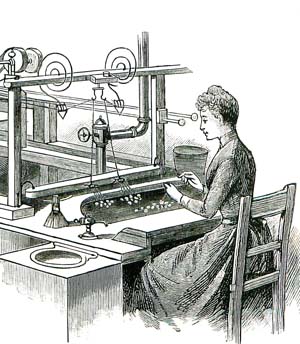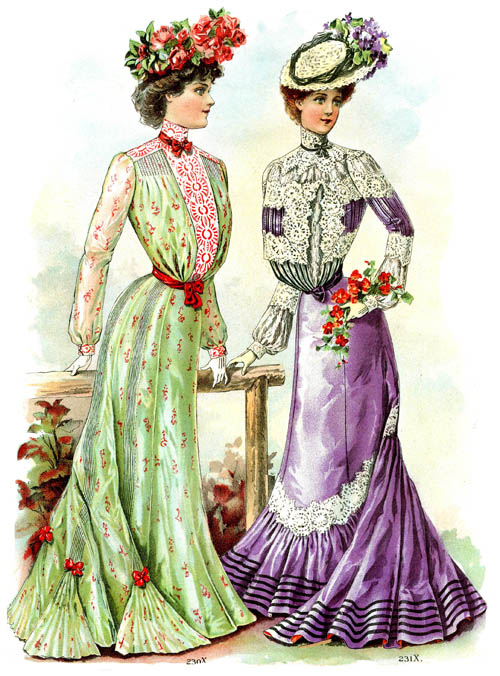|
Home > The Victorian Woman > The Working Woman > Should She Work?

|
As women of "good breeding" began entering the work-force in increasing numbers, articles abounded criticizing the working woman and offering a host of reasons why such women should stay at home. Many people interpret these articles as an indication of how "opposed" the Victorian world was to the working woman. The reality is a bit different. In fact, the Victorian era is the era that gave birth to the idea that a woman of any class could work without losing her reputation or social standing. The very existence of articles opposing the idea that "gentlewomen" might work is evidence that, in fact, women were doing just that. People don't bother to condemn something that isn't happening. The controversy exists because women were, for the first time, becoming part of the established workforce. If you're a working woman, don't bemoan the Victorian era as a period that would have kept you at home. It's the era that launched the woman worker upon the world!
|
- A Letter from a Lady of New England [on Women's Employment] (Godey's, 1863)
- A letter about the effects of the Civil War on women's employment.
- The Importance of Words (Godey's, 1867)
- Today, we're urged to encourage women's equality by removing genderized words from the language - no more stewardesses or waitresses! In 1867, the trend was just the opposite: to encourage recognition of the equality of women in various fields of work by adding feminine suffixes to such words. (In 1867, "waitress" was not yet a common term!)
- Questions of the 19th Century [Regarding Women in England] (Godey's, 1867)
- Eighteen Hundred and Sixty-Eight [Women's Issues]
(Godey's, 1868)
- Afternoon Thoughts [on working women] (Demorest, 1873)
- Equal Pay for Equal Work
(Godey's, 1873)
- Women as Physicians
(Demorest, 1873)
- An interesting argument, not against women doctors per se, but against becoming a doctor for the wrong reasons.
- Woman's Good Name
(Godey's, 1874)
- Another article on the importance of recognizing women's work by using feminine endings for words like "waitress" and "actress" - the article quotes heavily from the one run in 1867, above.
- An Aspect of the Labor Question
(Scribner's, 1879B)
- "There are women in large numbers striving for genteel employments, who would be a thousand times better in body and mind, if they were engaged in household work. There are men and women even in these hard times, when they hardly know where their next meal is coming from... who are still very difficult to please in the matter of work, and who will crowd their daughters into stores and shops, rather than apprentice them to dress-makers •where they may learn a useful trade and earn increased wages."
- Women and Business
(Century Magazine, 1882A)
- This article maintains that every woman should learn, as a girl, some trade with which she can earn a livelihood if necessary.
- Women's Wages, by Janet E. Ruutz-Rees
(Century Magazine, 1883A)
- Can Women Workers Support More Than Themselves?
(Demorest, 1884)
- "If a true census could be taken throughout this world, it would be discovered that there were more figureheads among men, more actual workers among women."
- The Importance of Women's Work, by the Rev. E.J. Hardy
(Girl's Own Paper, 1885)
- Though this article begins as an ode to domesticity, it concludes by pointing out that every girl should learn a handicraft, for "You can never tell how soon you may want it. How do you know that your father is not spending his capital--has not speculated, and will not leave you all penniless? Half the women in the United Kingdom have to support themselves somehow, and not a few of them, I blush to own it, support the men."
- Women and Finance, by Emily F. Wheeler
(Century Magazine, 1885B)
- "Even among self-supporting women, a head for finance is the exception. They are usually the resigned victims of their male relatives who relieve them of the trouble of investments, and are apt, sooner or later, with the best intentions and the most affectionate dispositions, to lose their savings for them."
- English Girls by Agatha Hart
(Girl's Own Paper, 1888)
- On earning a living, household economies, women's rights, and the realities that English girls face - this article covers a lot of ground!
- Make Your Daughters Independent, by G. Andrews
(Century Magazine, 1888B)
- Another Side of the Woman's Work Question, by L.E. Holman (Century Magazine, 1889B)
- "Let a girl feel that it is as natural and praiseworthy for her to earn her living as that her brother should; that if she would be as well paid as her brother she must be willing to give the same time, attention, effort, and endeavor to make herself a success and valuable to her employer as her brother does. She must be thorough." The author goes on to say that many women regard work as a temporary necessity and don't approach it with the same commitment as men, which causes employers to be more reluctant to hire women.
- One Reason of the Inefficiency of Women's Work, by Mary A. Johnson
(Century Magazine, 1889B)
- "Intellectual stagnation" is the culprit in this author's opinion; she points out the value of continuing to expand one's mind whether one is working at a job or as a wife and mother.
- Professional Mens' Wives
(Girl's Own Paper, 1890)
- "Girls and women are fond of speculating what profession they would have entered if they had belonged to the other sex.... Well, young ladies, you cannot directly fill these positions, but you can do so indirectly, in a way that is quite as honourable and not less influential. You may marry, and have in your hands the moulding of the careers of men who are clergymen, lawyers, doctors, officers, and such like."
- The Vocations of Men and Women, by the Rev. Dr. Tremlett
(Girl's Own Paper, 1890)
- Why women should remain...well, women! (And not try to take all those positions designed by God for men!)
- Women's Clubs in London, by S.F.A. Caulfeild
(Girl's Own Paper, 1890)
- "...we may observe the increase of improvident marriages and those of the physically unsuitable, the many failures of financial enterprises, the deterioration of the value of land... Thus the daughters of the very elite of the untitled aristocracy are driven from home... to become the bread-earners for themselves and their families... an article like this demands such an introduction as showing the origin of the needs-be for women's clubs."
- Mademoiselle L'Incomprise, by Lily Watson
(Girl's Own Paper, 1893)
- "Few social questions in the present day are more frequently asked than, What shall women do with their lives? What are they fitted to be? In what is the tradition of the past at fault? And all this stir and unrest cannot but powerfully affect the mental condition of the growing womanhood of our time."
- Women's Work and Wages
(Century Magazine, 1893B)
- The old, old question of "equal pay for equal work."
- The Progress of Women's Work, by S.F.A. Caulfeild
(Girl's Own Paper, 1894)
- A remarkable overview of the progress of women in various trades, such as medicine, covering not only England but the rest of the world as well.
- Women's Work: Its Value and Possibilities
(Girl's Own Paper, 1895)
- An American Woman on the English Working Girl
(Girl's Own Paper, 1895)
- A short piece on why, or whether, the English working-girl is "underpaid."
- Women and Business Life
(Cassell's Family Magazine, 1895)
- This author is clearly against the idea...
- No Place at Home, by Lucy Yates
(Girl's Own Paper, 1896)
- A somewhat confusing little piece that seems to be suggesting that young ladies should certainly be allowed to seek employment and test their wings -- but also should not enter into employment as "dabblers" and take jobs away from those who genuinely need them.
- Girls at Work
(Girl's Own Paper, 1897)
- On the dangers of limiting one's "ambitions" to those careers still considered "genteel" for ladies.
- A Pound a Week; Why Girls Should Earn It, by Margaret Bateson
(Girl's Own Paper, 1897)
- The Strides of Women, by Norma Lorimer
(Girl's Own Paper, 1898)
- A summary of women's progress to date, including an overview of important women of the day.
- Girls of Fifty Years Ago and Now, by Emma Brewer (Girl's Own Paper, 1901)
- On how far women have come since 1850 in education, careers, independence and more.
|
Visit Our Victorian Shop
for:
Books
Coloring Books
Beautiful Spiral Journals
Holiday Greeting Cards
|
|


 Discover thousands of Victorian images in our
Discover thousands of Victorian images in our 